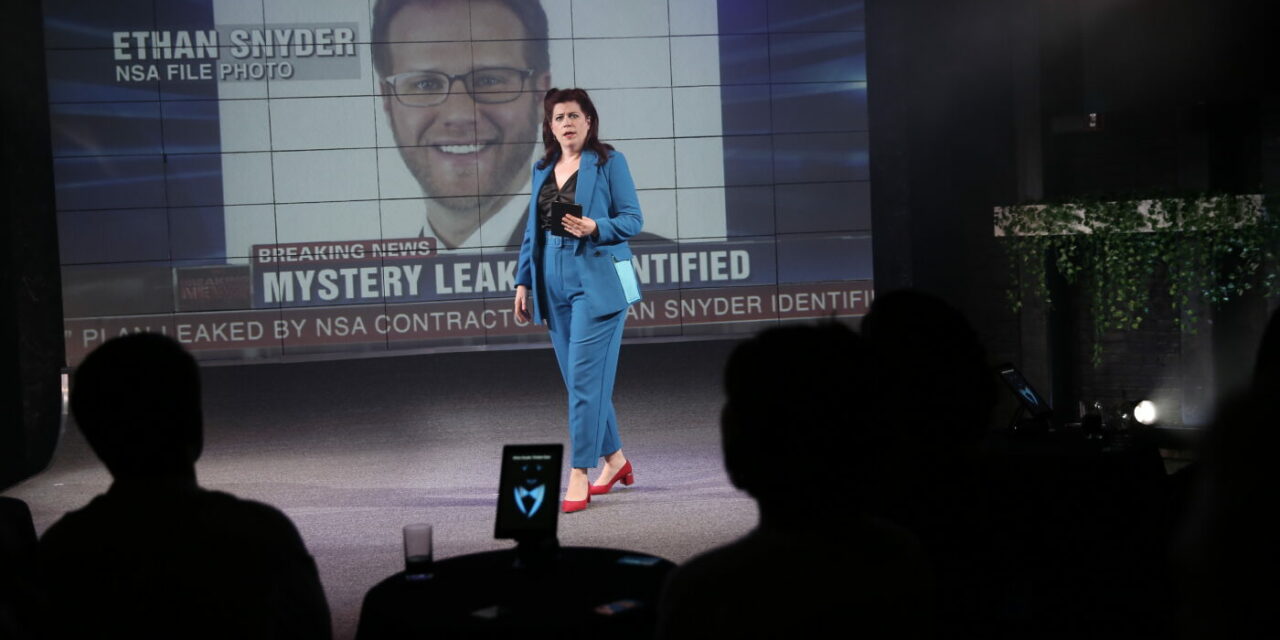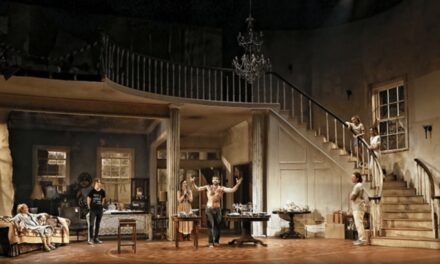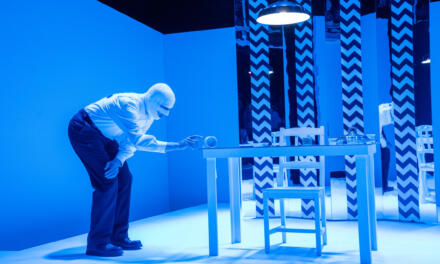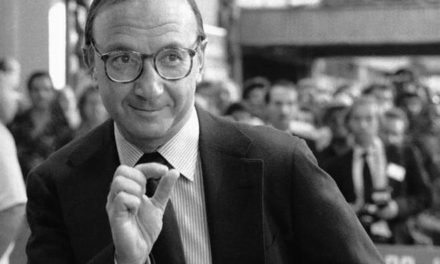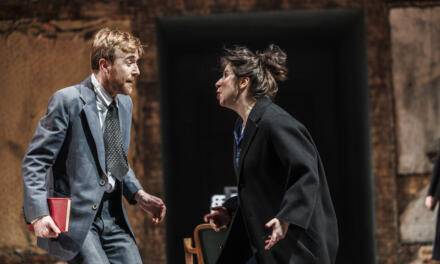My instinct is to describe Looking at You, the new opera from librettist Rob Handel, composer Kamala Sankaram, and director Kristin Marting, a work of sci-fi, but that would be naïve. I want to call it a cautionary tale, but the moral would be moot. The creators describe the show, now in its world premiere at HERE Arts Center in SoHo as “an immersive techno-noir opera experience.” Each of those descriptors brings you a little closer to understanding what the show aims for, but even that long-phrase can’t capture what it accomplishes. Looking at You is the most fun I’ve ever had while being scolded for my vanity and indifference.
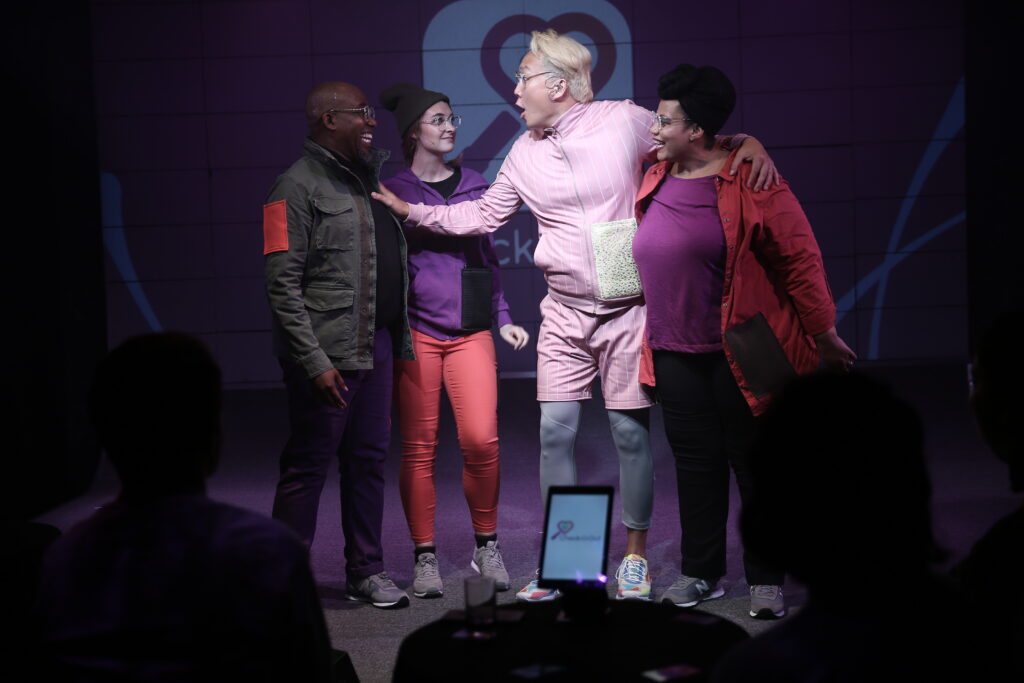
Photo by Paula Court
While the look and feel of the show is futuristic, in fact, it deals squarely with the present day. The app designer Dorothy (mezzo-soprano Blythe Gaissert) has just begun her new position at Rix, a media company with the self-congratulatory attitude of a start-up run by 20-year-olds who dropped out of MIT after they made their first million. The show opens as she’s onboarded by her boss Raj (bass Paul An) and the rest of the staff, sopranos Adrienne Danrich and Mikki Sodergren and baritone Eric McKeever in a song that describes the company as the place “where the winners end up.” Dorothy is talented and full of promise, but she has a skeleton in her encrypted closet – a relationship with Ethan Snyder (tenor Brandon Snook), an Edward Snowden-type whistleblower who ghosted her right around the time he leaked millions of classified government documents.
There are a number of sinister elements in the show, but the real antagonist is Big Data, the twenty-first-century heir to Big Brother. Dorothy’s breakthrough idea is an app called Check-U-Out. You aim your phone at anyone who catches your eye, snap their pic and an all-knowing algorithm analyzes their online activity, including social media but also, for example, banking, to determine compatibility. The opportunities for corporate abuse of such a technology are obvious but so is its consumer appeal. That’s how they getcha.
Looking at You wedges itself right into this conundrum. So much of the data that companies harvest to target us with ads is information we voluntarily surrender, or at least, we grant permission every time we lazily opt to “log in through Facebook.” We rely on websites and apps for instant validation of a new haircut or a kale salad with a perfectly poached egg, we check-in at hyped-up restaurants, we repost buzzy articles with comments. If anyone wanted to track us, wouldn’t none of us be hard to find. And that’s the optional stuff. All of us carry with us, at all times, pocket-sized audio-visual recording devices. Many of us would be quite literally lost without our phones. But what is the cost of convenience? And when we live so much of our lives in public, do we still retain the right to privacy?
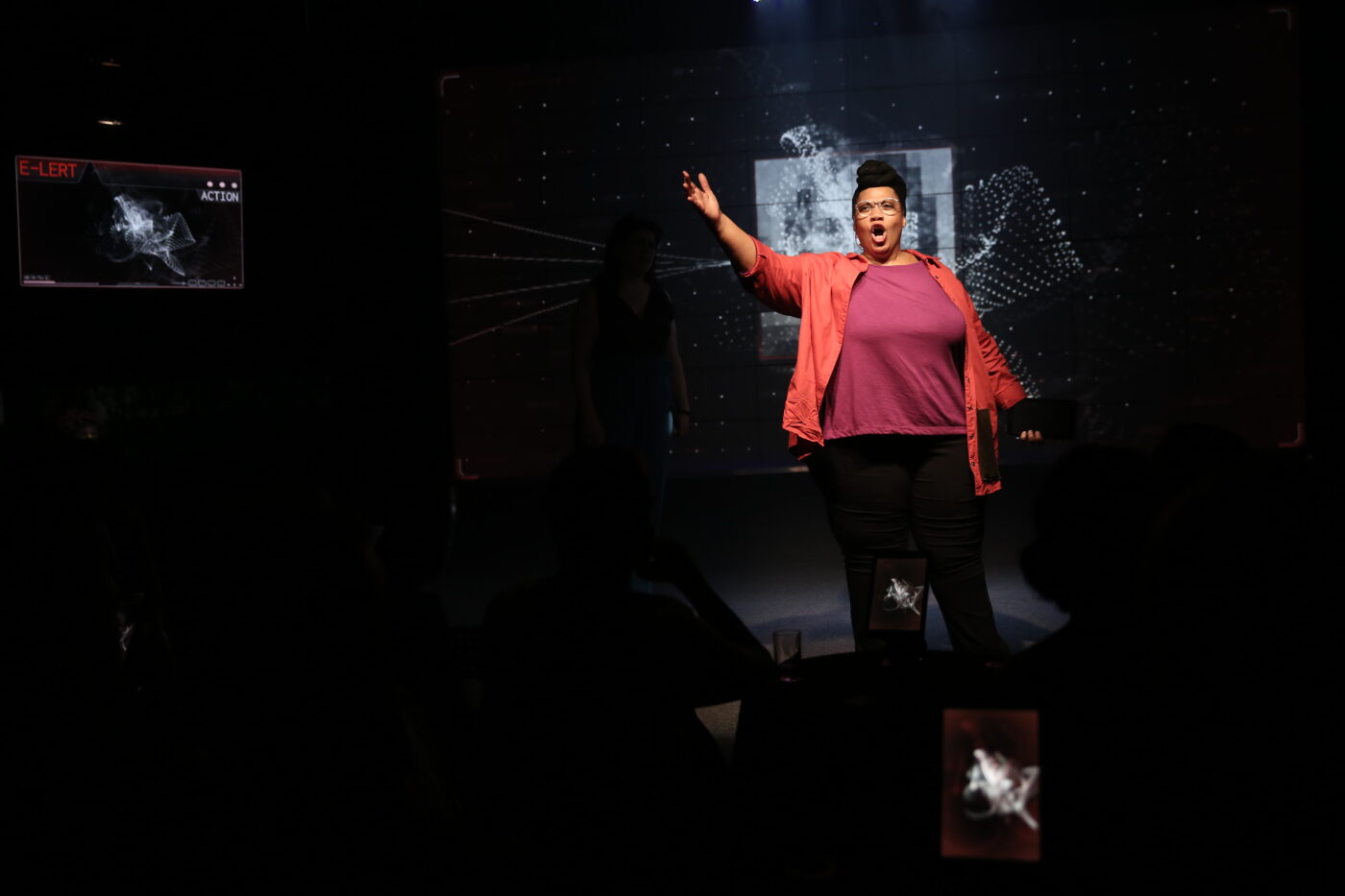
Photo by Paula Court
Amazingly, Looking at You isn’t bitter or self-righteous. Although its concerns are serious, it yields to playfulness, romance, and even hope. The use of technology in the design is truly the best I’ve ever seen in the theatre, a testament to the research and dedication of the creative team, which includes a whopping four technologists, Alessandro Acquisti, Ralph Gross, Joe Holt, and Daniel Dickison. There are bespoke Rix tablets, visualizations of algorithms that dance across screens and even live data-mining that happens before your very eyes. It doesn’t look like a set designer trying to imagine a computer program, on the contrary, it’s as dazzling as anything you might see in Silicon Valley. The detailed design even extends to the ticket, which addresses you as a Rix engineer and includes the following provision:
We are committed to respecting your privacy. We adhere to the following fair information principles: Accountability, lawfulness, fairness and transparency, purpose identification and limitation, data minimization, accuracy, storage limitation, and integrity and confidentiality. To further your enjoyment of the experience, it is necessary for us to obtain certain information about you. By submitting personal information (including email addresses) to us or to our agents, you agree that we may collect such personal information for the purpose of populating our proprietary software.
If you’re asked, when you arrive at the theater, if you want the “enhanced experience,” go for it. You’ll be confronted with the implications of all this in your own life. For me, it was simultaneously thrilling and terrifying.
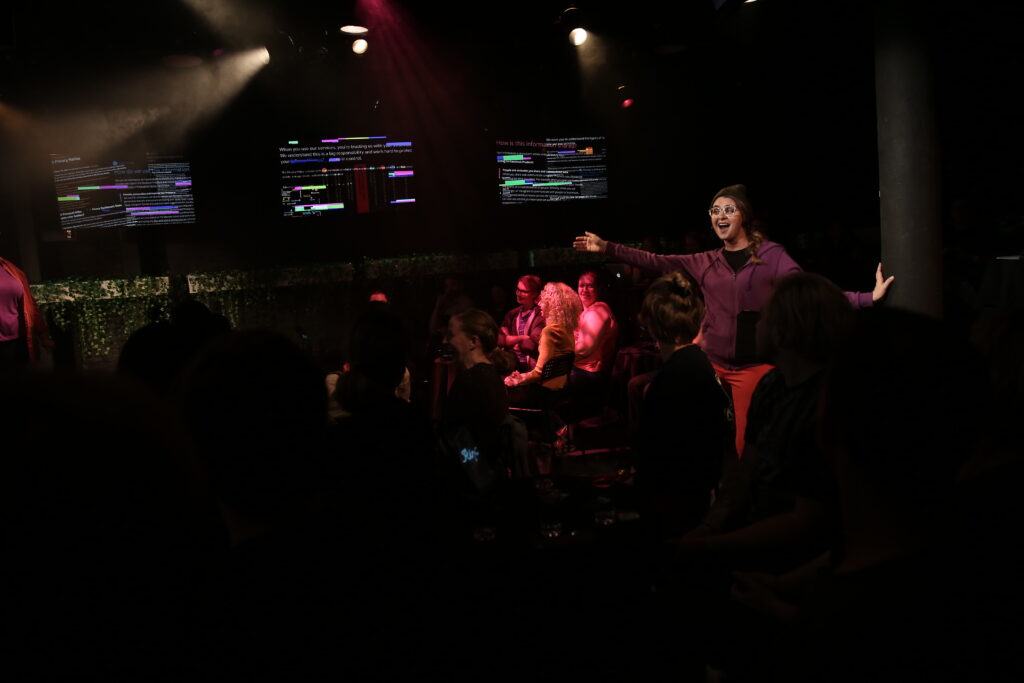
Photo by Paula Court
There is a risk with this conceit of verging into a gimmicky territory, but tech design is fully woven into the texture of the show. A particularly moving number has Dorothy recalling her relationship with Ethan via their text exchanges. The texts appear on the screen behind her as she sings both parts and we realize she’s reading them, like we all have when we’re heartbroken, in reverse, back from now to when she was happy.
The libretto sounds remarkably natural, a real feat given the conversational tone. That is aided, no doubt, by the cast, singers who overwhelm with their talent. I only wished I heard more from the ensemble performers, Danrich, Sodergren, and McKeever, but I’ll count it as a success that this show left me wanting more. The band features Mila Henry on piano and three saxophonists: Jeff Hudgins on alto, Ed Rosenberg III on tenor and Josh Sinton on baritone. The conductor Samuel McCoy, who seemed also to be giving cues for the tech and lighting, was the busiest person on stage.
When the show began, I thought it was like a musical episode of Black Mirror, the sci-fi anthology show that imagines terrifying scenarios based on technologies and behaviors that already exist today. But Looking at You doesn’t spin-out from a dark twisted fantasy; it stays firmly in the realm of the real. A better comparison may be The Net, a 1995 thriller featuring prime Sandra Bullock as an IT specialist whose life was threatened when all her online data was vindictively erased. At that early point in the Technological Revolution, Bullock couldn’t convince anyone of the danger of cyberterrorism; her insistence that this was a very real threat made her look crazy, like Sarah Connor. In 1995, the sight of Bullock ordering a pizza online was akin to a tech bro wearing a Google Glass: plausible, but fringe.
Today, we all know that all our banking information and medical history is online and could be deleted, or worse yet, shared, with push of a digital button. So what are the codes of conduct now, for consumers/citizens and for corporations/governments? And if you’re good at tech, do you have a responsibility to wield that talent for the greater good? No spoilers, but at the end of the opera, Ethan rhapsodizes about the early days of the internet. He sings:
This isn’t the world we were making.
Remember? Remember how it was?
Some kid in Bangladesh
Could play chess with some kid in Ohio.
A girl in Baghdad
Could tell the truth about our soldiers.
Remember? Remember how it was?
Remember how it was?
A wild place for the free people.
It meant we were safe.
It meant privacy.
The historian Melvin Kranzberg formulated a set of philosophical dicta known as the laws of technology. The first one states, “technology is neither good nor bad; nor is it neutral.” Looking at You is not neutral. But it is very, very good.
This post was written by the author in their personal capacity.The opinions expressed in this article are the author’s own and do not reflect the view of The Theatre Times, their staff or collaborators.
This post was written by Abigail Weil.
The views expressed here belong to the author and do not necessarily reflect our views and opinions.

